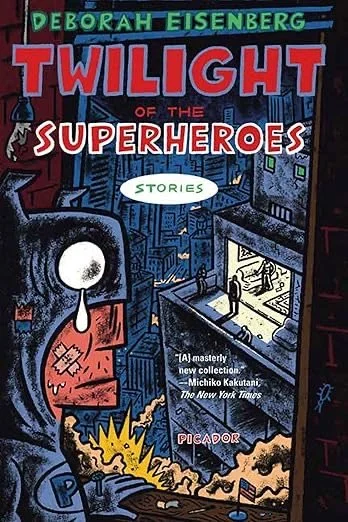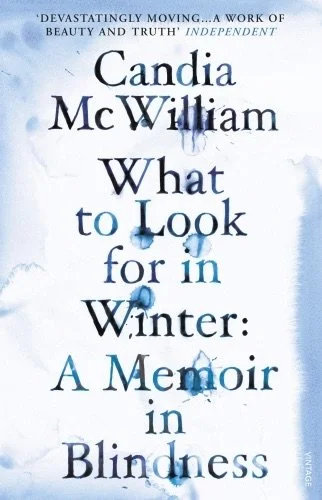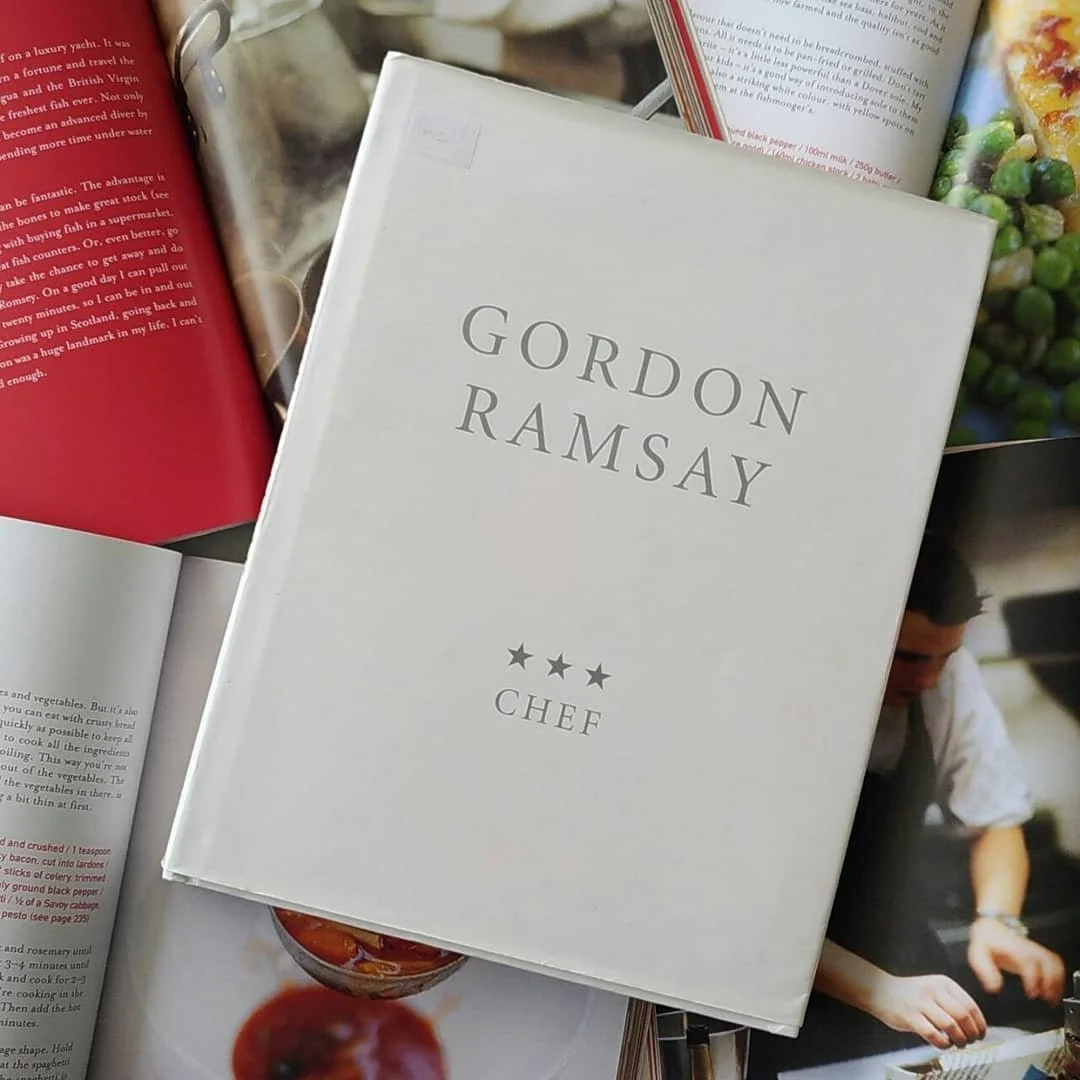
BOOK REVIEWS
We can all agree that reading is one of life’s greatest pleasures. Perhaps we can also agree that continuing to wallow for a while in that pleasure, thinking about what made it so good, and then writing to someone to tell them all about it, makes the whole experience even better... (As long, of course, as you like the book.)
The Twilit Zone
Financial Times, 21 July 2006
Twilight of the Superheroes by Deborah Eisenberg
Deborah Eisenberg is one of those writers beloved by other writers because she’s impressive without showing off. In Twilight of the Superheroes, her seventh collection of short stories – and, astonishingly, the first to find a publisher in the UK – she writes about the US of the new millennium. We have a lesbian couple adopting a Chinese baby; a young woman kidnapping the son of her violent, gun-dealing lover; a group of college grads landing themselves a New York apartment with “probably... the best view on the planet” which, for a while on 9/11, becomes “probably the worst”.
It’s an America in a twilight zone, where characters confront the blunt truths of existence – ageing, loss, how little we leave behind – and lives do not live up to expectations. In “Like it Or Not”, a middle-aged biology teacher accepts a trip to the coast with a suave Italian, only to discover a new awkwardness in the mirror of his gaze: “He smiled at her and briefly her arms and legs seemed to need rearrangement; what did one generally do with them?” Even superheroes have lost their pizzazz. The comic-strip creation of the title story is the ultimate slacker, Passivityman: “‘But you’d better do something, before it’s too late,’” urges Princess Prudence. “‘Sounds like it’s totally too late already,’ says Passivityman, reaching for a cigarette.”
This state-of-America is well observed and feels accurate but it plays second fiddle to the real point of Eisenberg’s writing, which is her note-perfect capturing of people and what goes on between them, particularly within families. In the flawless “Some Other, Better Otto”, the gay Otto wonders why he has to have so many “things” around him and why they all have to be “special”: “Special, beautiful plates; special, beautiful furniture; special, beautiful everything.” Other writers are capable of making such observations, but listen to the devastating little punch that follows: “And all that specialness, it occurred to him, intended only to ensure that no one – especially himself – could possibly underestimate his value.” There is moment after moment like this.
Take this delightful teenager’s view of an aunt and uncle who visit the provincial mid-west from New York “in their soft, stylish clothing. They’d brought books with them to read. When they talked to each other – and they habitually did – not only did they take turns, but also, what one said followed on what the other said. What world could they have come from?”
False notes stand out only because they are so surprising – the last line of “Window” is too neat for someone of Eisenberg’s subtlety, and the title story seems somehow ungestated, as if it has not been worked through as thoroughly as the other five in the book.
But Eisenberg is only human. Her stories are warm as well as clever, and she makes you smile as much as she haunts with stark truths. “It’s supposed to mean something to be one person rather than another,” comments a dismayed Lulu in “Revenge of the Dinosaurs”, when she sees her once elegant and acerbic grandmother reduced by a stroke to dumbly gazing at family photographs with her patronising nurse. Thankfully, it still does. In the US, many people consider Eisenberg to be up there with Alice Munro, the female monarch of the short-story form. It’s time the UK considered putting her up there too.
The Reluctant Memoirist
Financial Times, 9 August 2010
What to Look for in Winter: A Memoir in Blindness
by Candia McWilliam
The literary novelist Candia McWilliam is a reluctant memoirist. A few years ago, after it became known in publishing circles that she was an alcoholic, someone approached her with the suggestion that she write a guts-and-all misery memoir. She was so appalled by the idea that she drank for a fortnight. McWilliam is very much an intellectual; she’s also a Scot of the unsentimental variety, who by her own admission prefers to live “by suppression than by spillage”.
But in 2006, when she was sitting as a judge on the Man Booker prize, McWilliam began to suffer from a rare disorder called blepharospasm that caused her eyelids to clamp shut, rendering her functionally blind.
Her doctor reacted angrily to the idea that the condition had a psychological cause; but when a friend suggested that perhaps her eyes had shut because they had seen quite enough already, she decided it was time to write (or rather, dictate) “all this stuff I swore I would not write, ever”, just in case “the precise naming of things” would work the sadness out and bring her vision back.
What to Look for in Winter: A Memoir in Blindness is a story of loss and self-destructiveness, beginning with a mother who commits suicide and ending with the loss through blindness of her greatest solitary pleasure: reading.
The journey in between is not unenchanted – there are summer houses in Holland, and on the Hebridean island of Colonsay, like minds (but also alcohol) at Cambridge, and, eventually, three children by two men she loves. And this is not to mention the literary successes which, tainted as they are by her unappreciative relatives, barely get a mention. Even when she’s a single mother she manages to have John Gielgud as a next-door neighbour.
But this of course makes McWilliam’s self-hatred all the more poignant. She is someone who “rushed to hurt myself before anyone else did”, and it is devastating to see how she herself “conducted the lightning strike” that cleaved her from a near-perfect relationship with her second husband, Fram – a mistake that fills her with a burning regret 13 years on.
McWilliam has a big heart, and is unceasingly generous – and joyous – in her description of others, even the new partner of her still-loved Fram. She’s also a master of characterisation. From the junkies she meets in rehab to the delightful Howards of Colonsay who need “to hack and dig to make a day feel lived through”, the people in this book are so precisely and deftly drawn you might peel them off the page. Sometimes just one sentence is all she requires: “The thing about Anthony was that he had some paisley flares and a blue rollneck and he could play the piano.” Yet when she turns her sharp, beautiful pen on herself, it makes for almost unbearable reading. We yearn to come between this woman and her description of herself as “a head mounted on a bit of taxidermy of, say, a large beast like a sea lion, that is falling in, sawdust and kapok spilling at unseemly seams”.
Candia McWilliam was famously accused, in a review, of having “swallowed the dictionary”. She is certainly no Hemingway, but her love and understanding of words is so gorgeously apparent in this memoir (“fragile”, she contends, is “too strong and consonantly pegged down” a word to describe blue flowers; “frail” does the job much better), that it cements her status as one of our most important literary writers beyond question. She has also achieved a rare thing: a misery memoir that, while touching on the far reaches of pain, leaves one feeling enriched, not dirty. Her hope was that it would bring back her sight; mine is that it will lead readers back to her fiction.
All Hands on Deck
Financial Times, 5 January 2008
***Chef by Gordon Ramsay
My Last Supper by Melanie Dunea
Every so often, someone brings out a cookery book which is so lavish in its production that it seems entirely inappropriate to bring it into the kitchen and risk getting gravy on it. If ever a cookbook seemed to fit this category it is Gordon Ramsay’s *** Chef.
Encased in its own silver slip case, it looks like something you might open at a wedding and get the bride and groom to sign. Its pristine white cover has nothing but the title and Ramsay’s name embossed in silver on it, and it’s so big and heavy that it should come with its own lectern.
Reviewers on Amazon warned that only a foolhardy amateur cook would try and cook a recipe from it at home. “I really wouldn’t suggest anyone other than a professional cook attempt any of them,” said one. But what was the point of three Michelin stars if it meant the cookbook didn’t function as a cookbook? So I did what any normal, irritated person would do and invited six friends to supper.
To be fair, my irritation had already been triggered by a cookery book also recently published that seemed to fit the egotistical-to-the-point-of-diminished-utility category even more, Melanie Dunea’s My Last Supper. Dunea, a New York-based photographer (for Vanity Fair among other things), asked 50 of the world’s most famous chefs to describe the meal they would choose to eat, with whom and in what setting, for their last meal on Earth.
The answers are mostly predictable. Jamie Oliver opts for a big pot of spaghetti all’arrabiata, homemade rice pudding, the sofa with Jules and the telly in the background. Instead of photographs of the meals there are glossy portraits of the chefs in the naughty-but-glamorous style of Vanity Fair covers – Anthony Bourdain, chef at Brasserie Les Halles in New York and author of Kitchen Confidential, for instance, is pictured naked holding a large uncooked bone – while the recipes are squeezed unceremoniously into a few pages at the back. Mustering up any sort of appetite when you’re being asked to contemplate a naked man holding a bloody bone is surely beyond the stretch of even the most ardent foodie.
So it was *** Chef I pulled from its sumptuous sleeve the night before my dinner party to select a menu. Ten minutes later I called my guests telling them dinner was rescheduled for four days’ time. “Yes, you need to set aside four days to make anything in Gordon Ramsay’s books and even then it’s a risk without a committed sous-chef,” one guest emailed back.
*** Chef begins with a mouth-watering photographic portfolio of 16 starters, 17 mains and 17 desserts, presented as they are served at Ramsay’s eponymous restaurant in Chelsea. Then come the recipes, a double-page spread devoted to each one.
I chose by a process of elimination. “Cooking fish is one of the biggest tests of any chef,” I read. “It needs a deft touch and is much less forgiving than a piece of meat.” That ruled out fish. I also ruled out carpaccios and anything with more than one meat/fish ingredient.
I ruled out anything that looked like it should be entered for the Turner Prize (the raspberry, lemon and basil millefeuille) and anything with the words “time-consuming” in the recipe. I ruled out ravioli of lobster, langoustine and salmon as I knew that was Ramsay’s signature dish and my confidence was waning fast. I ruled out anything involving foie gras and snails because – well, just because.
In the end I went for roasted loin of venison with braised red cabbage and parsnip chips, because my mum is good at red cabbage and I could always ring her if things got sticky.
To start I chose scallops with sweetcorn purée and quail’s eggs, on the grounds that it had the words “simple” and “quick” in the description, and for dessert there’d be caramelised apple tarte tatin with vanilla ice-cream, which was comfortingly familiar.
The next couple of days were spent hunting down the best ingredients, with various Ramsay rallying cries for perfection ricocheting around my head. (“Every fillet of beef, every saddle of hare, every basket of truffles is a fight you have to win. You’re up against yourself every time.”)
I made stock from a kilo of raw chicken bones and a kilo-and-a-half of pre-roasted veal bones. I read that in Ramsay’s restaurants the stocks are left to bubble overnight, so I took this as permission to go out to a party and came home four hours later to an intense, wonderful smell – and barely any liquid left in the pot. Aha, I thought, the battles with myself have begun.
“In a three-star restaurant we expect cooking of the highest quality – for it to show flair, finesse and balance,” I read, so far with just 200ml of red wine sauce to show for nearly two whole days of work. “But more than that, we expect the cook’s personality to show through.” Fine, I thought, putting my feet up. I’ll just let the knackered side of myself come through.
But anxiety and pride won out. By the afternoon of the dinner I had sweet, buttery red cabbage, I had smooth parsnip purée and lumpy sweetcorn purée. I had olive oil infused with truffles. I had dried porcini standing in as fresh ceps. I had quarters of Pink Lady apples and precisely measured 20in puff pastry rounds chilling in the fridge. The only thing I didn’t have was a sous-chef.
When he finally turned up, three hours late, he found me lying prostrate on the kitchen floor. “Tread carefully,” I told him. “A spell in Gordon’s kitchen has been compared to a tour of duty in Vietnam.” He took one look at my devastated kitchen and went, bizarrely, to get the toolbox.
As soon as guests arrived they were enlisted as commis chefs, given truffles to grate and parsnips to peel into strips. My sous-chef redeemed himself by his inventive use of limited resources: an upside-down egg cup trimmed the fried quail’s eggs into perfect rounds, a teapot ensured the red wine sauce poured smoothly, a pair of pliers lifted hot handle-less pans from hob to oven. I started to develop aspirations I hadn’t planned on. Not only would this meal taste good, it would look good. “A good meal is like a well-orchestrated piece of chamber music,” Gordon had written. Yes, yes, so it is! I thought.
By the end of the evening I’d fired all but one of my commis chefs for incompetence, or for eating parsnip chips ahead of time. We’d used every utensil and piece of cutlery I possessed. The garden was strewn with washing-up that wouldn’t fit in the sink.
The meal itself had its faults – the scallops were cold by the time we’d fried the last quail’s egg (you try frying 21 in a row without getting shell in the pan), and the main course didn’t arrive until 10.30 – but the food was, though I say so myself, completely awesome. We talked about little other than the food and wine (three superlative ones from Berry Bros) all evening. “That was off-the-charts wonderful,” said a friend-turned-fired-commis-chef the next day. “Dinner at your place will never be the same again.”
And there’s the rub. I would now categorise *** Chef as a fully functional cookery book. The recipes are clear and easy to follow and the pictures show you exactly how each dish should look. Yes, you need to balance the book on a chair with a doorstop to keep it open, give up several days of your life, use expensive ingredients, and have friends who don’t mind doing half the work or being told off for doing it wrong. But this book taught me that an average chef can cook restaurant-style food at home. The thing is, what sensible person would choose to put themselves through the ordeal?


